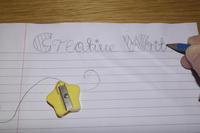Helping your child to improve their creative writing
Earlier this week, a parent asked me about how they could help their child improve their creative writing skills. It is important to keep the plot of a story simple, otherwise the child will not get anywhere near finishing it. It is also a lot easier to write about something you have experienced or know about. So if a child has not been to India, it would probably not be a good idea to write a story with the title "My adventures in India". It is also important to stick to either the present or the past tense rather than switching suddenly between the present and the past.
I find that children often miss out descriptive adjectives and adverbs, so I do quite a lot of work on getting them to add adjectives or adverbs into a piece of writing. Children sometimes think that "the boy walked down the road" is enough, whereas they should be writing something more like "the tall, thin boy walked nervously down the dark, spooky road". I have a saying I often use with children that I am tutoring: "Every verb should have an adverb and every noun should have an adjective". This could lead to overkill, but the end result is a lot better than a series of sentences with no adjectives and adverbs in them at all. Your child should try to see things from the reader's point of view: what would they want to know more about? If you mention a cat, describe it: what colour is it? how does it move? is it staring at you?
Here are some helpful hints from a child who was successful in the eleven plus last year:
(1) Tips on how to make a plan: create your title; write down your main characters/objects and a few facts about them; choose your setting e.g. a unicorn castle or a haunted house; write down a story plan from start to finish; note down any great descriptive words to include.
(2) To create suspense: use short, snappy sentences; use a thesaurus to choose specific vocabulary.
(3) For fantasy writing: use your knowledge of other stories e.g. Harry Potter, and adapt the language they use; choose your language carefully to create the right atmosphere.
(4) For a great setting: incorporate all the five senses; don't always say exactly what something is e.g. "the eight-legged creature" (spider).
(5) Try to begin some sentences with adjectives and adverbs e.g. "Slowly, the snake slithered through the grass".
(6) Don't forget the basics like starting each sentence with a capital letter and ending it with a full stop.



Comments